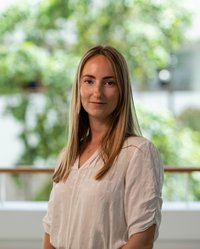Master's Degree Programme
| About the programme Language: English (See language requirements) | Place of study: Aarhus | Commencement: August / September (no winter intake) |
Business Intelligence (BI) bridges the gap between modern data science and business applications by transforming data into insights that enable strategic business decision-making. The MSc in Economics and Business Administration – Business Intelligence takes a data-driven approach to solving business problems by focusing on:
The BI programme aims to prepare the students to use a variety of state-of-the-art data analytics tools and apply data science to solve the complex and interdisciplinary challenges that businesses face. During the BI programme, the students will work with data-driven business projects such as:
Combining a solid business understanding with strong analytical skills is essential for turning data into business value. The BI programme is designed to equip participants with the analytical expertise needed for managerial and data specialist roles in both private and public sectors, as well as consulting firms. Participants will gain experience in planning and implementing business intelligence solutions, utilising the latest methods in machine learning, data mining, and deep learning. They will acquire the ability to generate insights from large and complex datasets, commonly known as Big Data. Additionally, attendees will become proficient in using data analysis programming languages such as R, SQL, and Python for tasks ranging from data structuring and extraction to modelling, communication, and deployment.
Graduates who complete the Business Intelligence programme acquire analytical and quantitative skills that are highly demanded by both the public and private sector. BI graduates take up positions in international or Danish companies, public institutions, and consulting firms as BI consultants, data scientists, data engineers, advanced data analysts, machine learning developers, or product owners. After a few years on the labour market, many BI graduates advance to senior data specialist roles (senior data scientist, senior automation engineer, etc.) or managerial roles (BI lead, head of AI, etc.).
In this section you can learn more about the admission requirements relevant to the master's degree programme in Business Intelligence. Depending on your educational background and your qualifications, there are different ways to meet the admission requirements:
This section is relevant for you, if you have:
The two sections listed below are relevant only for students with a bachelor's degree from a Danish institution:
Below these sections, you can learn more about the English language requirement. You can also find out which ranking criteria we use to assess your application when prioritizing among the submitted applications.
If you have an international educational background, you must meet both the general admission requirement and the specific admission requirements:
You must have a bachelor's degree or equivalent that is comparable to a Danish bachelor's degree in both level and duration (180 ECTS).
For more information about how your bachelor's degree is assessed, please see the national database.
If you meet the general admission requirement, the university will continue on to assess whether or not you meet the specific admission requirements.
You can be admitted to the master's programme if the university assesses that your education has a level, scope, and content that corresponds to the academic requirements specified below.
| Subject area | Number of ECTS |
Methods The following subject areas must be covered:
| 15 |
| Marketing | 7,5 |
| Finance | 7,5 |
| Accounting | 7,5 |
| Organisation and leadership theory | 7,5 |
| Microeconomics | 5 |
| Operations management | 5 |
| Additional ECTS points within the abovementioned areas | 20 |
| Bachelor’s project | 10 |
| Total | 85 |
| Applicants with a Bachelor’s degree in Business Administration and Commercial Law (HA (jur.)) with commencement of study September 2014 or later from Aarhus University must have passed a total of 10 ECTS within the business economics subjects below: |
|
Certain Professional Bachelor's degrees or similar covering specific subject areas from other Danish institutions have been determined to fullfill the admission requirements to this master's degree programme:
| Required subject areas – Professional Bachelor’s degree in Financial Management and Service from Business Academy Aarhus |
Industry specialisation in Accounting (“Programme specialisation subject A – external accounts” and “Study programme subject B – strategic accounting”) With the following electives:
|
Industry specialisation in Finansielle forretninger (this industry specialisation is only offered in Danish) With the following electives:
|
| Required subject areas - AP degree in Marketing Management in combination with a Professional Bachelor’s degree in International Sales and Marketing from Business Academy Aarhus | Number of ECTS |
| BSS module (including Methods 5 ECTS, Finance 5 ECTS, and Operations Management 5 ECTS) | 15 |
For applicants who hold one of the abovementioned professional bachelor's degrees from another business academy, it will be assessed whether the electives correspond to abovementioned electives.
For applicants who hold another professional bachelor's degree, the degree will be assessed according to the requirements described in the section “International and other qualifications”.
We cannot assess in advance whether your specific degree will meet the above requirements. Therefore, we recommend that you apply for the programme if you believe that you meet the academic requirements. In this regard, it is a good idea to compare your degree with the programmes that provide direct admission.
The following Bachelor's degree programme(s) from Aarhus University entitles you to an offer of admission to the Master's degree programme in Business Intelligence:
Bachelor's degree programme in Economics and Business Administration (HA)
Please note that you must apply for admission to the Master's degree programme within three years of completing your Bachelor's degree programme.
Learn more about Legal right of admission.
Certain Bachelor's degree programmes from Aarhus University and various other Danish Universities have been determined to meet the admission requirements to this Master's degree programme in Business Intelligence:
* With a diploma older than 2010, your Bachelor’s degree will be assessed according to the specific admission requirements described under the section: “International and other qualifications”.
If you hold a Bachelor’s degree from a non-Danish university, you must complete the appendix below and upload it to the application portal. The appendix helps the academic assessors with the assessment of your application.
Download appendix
All Master’s degree programmes at Aarhus University have limited intake. This means that you are not guaranteed admission even if you meet the entry requirements. When we prioritize among applicants, we assess your application based on a set of fixed ranking criteria, which you can see below.
If you have a legal right of admission, you are guaranteed a place in the programme and do not need to consider the ranking criteria.
Ranking criteria:
Grades from the qualifying degree
Grades achieved in relevant subject fields:
Methods
Relevant subject fields (measured in ECTS). In this assessment, ECTS credits that are a part of the admission requirements described under “International and other qualifications” are not included *.
Methods
* The relevant subject fields are evaluated based on the following point system: 1 point per additional ECTS within the relevant field. You can earn a maximum of 15 points in this criterion. Example: If you have 10 ECTS in a relevant field where the requirement is 7.5 ECTS, you will receive 2.5 points.
Please note that grades achieved after the application deadline are not included in the assessment.
In order to be admitted to this programme you must meet the university's English language requirements.
Students with bachelor's degree from Aarhus University with a so-called 'Legal right of admission' are exempt from the English language requirement.
Unfortunately, Aarhus University is not able to assess your qualifications beforehand. In order for your qualifications to be assessed you must apply for admission. To learn more, please go to Assessment of your qualifications.
ACADEMIC REGULATIONS
Below is an outline of the courses:
The study programme consists of two semesters in the first year which cover the compulsory courses in the programme specialisation and two semesters in the last year which are reserved for the student's own specialisation.
In the first semester you follow the prerequisite courses that form the methodological and academic basis for the further study programme.
In the second semester you follow the specialisation courses of the programme.
In the third semester you can choose elective courses within your areas of interest. The courses can either be taken at Aarhus BSS during the semester, at the Summer University or at one of our more than 300 partner universities abroad. You can also participate in project-based internship programmes either in Denmark or abroad.
The fourth semester is devoted to the final thesis. You may choose the topic of the thesis freely and so get a chance to concentrate on and specialise in a specific field of interest. The thesis may be written in collaboration with another student or it may be the result of your individual effort.
Please note that you must select the specific Master's degree programme, Business Intelligence, in the tabs just above the study diagram!
Contact Jesper Wulff (jwulff@econ.au.dk) if you have questions about the track or the individual courses.
Starting from 2028, it is planned that the MSc in Economics and Business Administration (cand. merc.) will be offered as both a 1-year and a 2-year Master's degree programme.
If you have a legal right of admission to this programme because you have a specific bachelor's degree from Aarhus University, we expect that your right of admission will apply to the 1-year programme.
When we know more about the new structure, we will provide updates on this page.
Life as a Business Intelligence student extends well beyond the classroom. The programme offers a vibrant community where students, alumni, faculty, and industry professionals come together to share knowledge, exchange ideas, and build networks.
A central event is BI-DAY, a recurring seminar series and professional networking forum that brings together cand.merc.(BI) students and alumni, Business Intelligence professionals, Aarhus BSS partner companies, and university faculty. BI-DAY provides a unique platform for engaging with current industry challenges, gaining insights from leading experts, and expanding professional networks.
Student life is further enriched by BIA – the Business Intelligence Association (https://bia-bss.dk/), the official student organisation for MSc in Business Intelligence students at Aarhus BSS. BIA bridges academic study with professional practice through company visits, workshops, study trips, and its flagship event, the BIA Summit. These activities give students practical insights into BI applications, direct contact with industry partners, and opportunities to strengthen both professional networks and social bonds with peers.
At Aarhus BSS, we conduct research at the highest academic level.
All researchers employed are engaged in research projects covering a wide range of different subjects and focusing on knowledge and skills considered essential for professional business activities in the global marketplace. All faculty have both research and teaching responsibilities, which means that our teaching is continually based on the latest research results.
Aarhus BSS is very internationally oriented. The broad scope of our research activities and educational programmes enable us to attract researchers, teachers, and students from all over the world, and this creates an international environment for research and learning in which academic views are exchanged, experiences are gathered and friendships are formed.
Aarhus University is a leading university in Denmark in building student exchange opportunities. The university encourages all students to spend time studying abroad. Every year, more than 700 students from Aarhus BSS go abroad to participate in exchange programmes around the world at our more than 300 partner universities. About the same number of students from all over the world come to participate in the exchange programme in Aarhus, and this contributes to a truly international learning atmosphere.
-experienced, photographed and filmed by the students themselves.
With thousands of pictures #AUInternational, #AarhusUni gives insight into the everyday life as a student at AU; the parties, procrastination, exams and all the other ways you’ll spend your time at university.
The photos belong to the users, shared with #AUInternational and #AarhusUni.

"The MSc in Business Intelligence allowed me to gain a broad understanding of data-driven decision-making processes, advanced analytics, and BI tools. The programme not only built my analytical skills foundation but also taught me how to turn complex data into useful insights. Since graduating, I've confidently applied what I learned, helping organisations leverage data optimally for strategic advantage."
Peer Woyczechowski, Senior Data Scientist, Inspari. 2022 Graduate
LinkedIn

"The programme gave me both the theoretical knowledge and the practical programming experience to apply data science in the real world. The programme offers a good balance between theory and application, but with an ongoing focus on creating business value. Having the mindset of business value creation has been key for me when developing data-driven solutions that can have a significant impact on businesses."
Emilie Sophie Rosenkilde Christensen, Portfolio Lead, Novo Nordisk. 2020 Graduate
LinkedIn

“The data science field is a rapidly growing one. Studying Business Intelligence equipped me with essential analytical tools and techniques to make data-driven decisions, which has been invaluable in my career. What you're learning here is not just theoretical; it's directly applicable in both industry and academia. This programme forms the bedrock of your capacity to navigate and work with data, a skill set in high demand across diverse sectors. This is the future – so what are you waiting for?”
Morten Kloster Pedersen, Lead Quantitative Analyst, Nitor Energy. 2019 Graduate
LinkedIn

“In a time where generative AI and data-driven practices are reshaping industries, the ability to connect technical expertise with strategic thinking has never been more critical. The Business Intelligence programme gave me both the technical skills and the business perspective to contribute meaningfully to that transformation. Today, I apply these skills in my daily work, bridging the gap between data, business, and technology.”
Lea Stenum Hagelskjær, Consultant, Dataminds. 2025 Graduate

"The Business Intelligence programme gave me the prerequisites to understand, and build upon, my knowledge of what it means to be a specialist, in what might be seen as a generalist discipline, of applied methodological use of data and analytics to generate business value and outcomes. With the rise of emerging generative-AI, cloud-, and data-technologies that every company seeks to adopt, the demand for people with such skillsets is as high as ever, and this greenfield with endless opportunities, is just what the programme thought me how to explore and utilise, which has been of great importance to my career so far.
Michael Thruesen, Head of AI and Data Science, Danske Bank. 2017 Graduate
LinkedIn
Graduates of the Business Intelligence programme acquire strong analytical and quantitative skills that are highly sought after in both the private and public sectors. Our alumni pursue careers in international and Danish companies, public institutions, and consulting firms in roles such as BI consultant, data scientist, data engineer, advanced data analyst, machine learning developer, or product owner.
After gaining experience in the labour market, many BI graduates advance into senior specialist positions (e.g. senior data scientist, senior automation engineer) or move into leadership roles (e.g. BI lead, head of AI).
Collaboration with the business community
To further support these career opportunities, the programme is closely connected to the business community through its Advisory Board. The Board provides strategic insight and guidance to ensure the programme remains aligned with industry needs and future trends. It actively contributes to discussions on curriculum development, the design and content of core courses, and the integration of emerging technologies such as generative AI. The Board also advises on desired graduate competencies, employer practices, and the implications of forthcoming graduate reforms. Get inspired by the career paths of the current members of the Advisory Board for Business Intelligence.
Career service
We want to help our students find successful careers. Students can always contact our Career services for advice and assistance with getting onto the Danish labour market. Check out our careers page to see the range of services we offer.